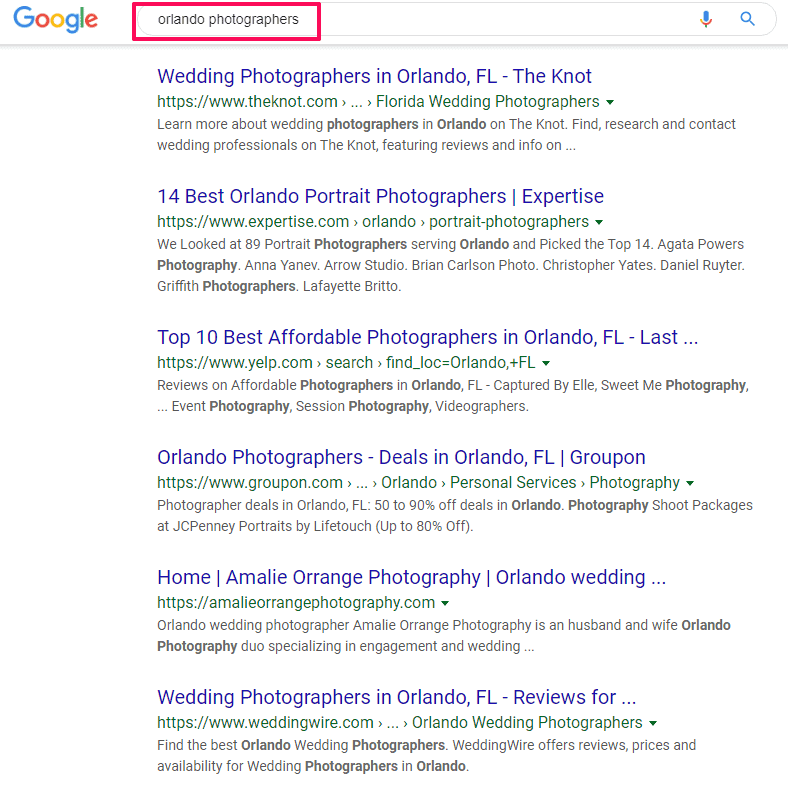
Marketing is one of the hardest things for any business to do effectively. This is especially true for photographers since we offer services that have a lot of competition in the market. Writing relevant content for your audience is the first step to improve SEO, and if you use the right keywords, you will be able to attract and convert more clients.
After running my own photography business for three years, I have had the chance to talk with dozens of photographers about their photography marketing efforts.
Most of the time, I have found that photographers are great at explaining what they do to clients, but they lack the knowledge to communicate their value through online marketing.
SEO marketing is a cornerstone for all photographers because it provides an organic way to reach your target audience. SEO is based on how well the content you create meets the needs of searchers looking for your photography services.
Finding the right keywords for you doesn’t require a marketing degree. Here are some tips you can follow to find the right photography keywords to improve your photography business SEO.
Why Keywords Matter for Photographer SEO?
Search Engine Optimization (SEO) is the process of making your website fit search engine requirements. By optimizing your content, you can appear in more searches and attract more customers.
Search engines are conduits that connect you to future clients based on the phrases and questions they search for.
Keyword research is fundamental to building a successful website, getting found online, and growing your photography business in a digital world. Having the right keywords on your professional photography page can help you gain traction and attention from potential customers because search engines will show your content above your competitors.

Companies in every industry use SEO, and photographers are no exception. When your website is optimized correctly, your photography business will appear in a search conducted by potential customers looking to hire you.
However, SEO begins with keyword research. Keywords are the words or phrases that a customer will type into the search bar when trying to find your business or a business like yours. For your website to appear, you need to use the right keywords throughout your site so the search engines know what your page offers.
While SEO and keyword research may sound easy, you need to take your time to find the best keywords for your site. You should keep a few points in mind when building a keyword list to attract the best customers:
- Use keywords that are relevant to your location, ideal customers, and photography services.
- Focus your attention on long-tail keywords. These are terms that your customers would use who are closer to a purchasing decision. These keywords will have lower search volume, but they will result in more conversions. Plus, you can easily rank for these terms.
- Assign 5-7 unique keywords for each page on your site. Use the keywords when appropriate in your content. Also, remember to include the same keywords in your meta description, titles, and headers.
Choosing the right photography keywords helps you appear in the most relevant searches, increasing your chances that a search engine user will reach out and use your business. But you can’t just guess what the right keywords are.
Steps to Find the Right Keywords For Your Photography Website

Just guessing what your audience members are searching for isn’t practical. Instead, you can follow this three-step process to identify the right keywords.
1. Define Your Business Goals
To begin your SEO for photographers’ strategy, you need to determine what you’d like to accomplish. Understanding your photography business goals can help you identify the audience you’d like to target and what you can provide to them.
Within the photography business, there are a lot of different services you can provide. If you have a specialty, such as weddings or graduation photos, you’ll want to make this known in the keywords that you chose. Just targeting “photography” isn’t enough.
You’ll also want to identify the demographic and geographic area you’re going to serve. Because photography is a location-based service, you’ll need to choose the area you’re going to operate within. This could include just a city, or if you’re willing to travel, a region or state.
Your business goals help you get specific in your keywords. This can reduce your competition and ensure you’re only getting the attention of customers who need what you can provide.
2. Think Like Your Customers
Everyone uses search engines differently, meaning keywords can look different depending on the people you’re trying to target. When identifying keywords that fit with the business goals you laid out in Step 1, you need to do so from your customer’s perspective.
Know what your audience is searching for and the kinds of language they use. Know what is important to them, such as budget, so you’ll know what to target in the keywords you choose.
To get to know your customers, their language, and their needs, you can create a user persona of your ideal customer. A user persona is an image of your “ideal” customer. While all your customers might not fit this example correctly, it can give you an idea of who you’re targeting to create stronger messaging.
Your user persona should explain the basic demographics of who your target audience is, such as age, gender, income, and where they live. However, it should also explore problems that your customers are experiencing that you can solve.
The keywords you choose should reflect the questions, needs, and phrases that your customers use when they go to Google or other search engines. There are a few tools that can help you identify the questions your customers are asking online, and here are a few of my favorite SEO keyword tools.
Answer The Public

Answer The Public is a great tool that will help you visualize what people ask in search engines based on a specific topic. You can put in a base set of keywords, and Answer The Public scrapes Google and Bing to generate a list of questions that your customers are using.
You can use the keywords to improve your content for SEO and user engagement.
Soovle

Soovle is a customizable database that scrapes Google, Bing, Amazon, Answers.com, Yahoo, Wikipedia, Youtube. This tool is not as user-friendly as other options, but the results it provides are similar to results from paid keyword research tools.
Google Analytics & Google Search Console
If you have been running your photography website for some time, then you can find valuable data that will help you improve your content and help with keyword research.
Both of these free tools are provided by Google, and you can find the keywords that you are currently ranking for. You can use this information to find new opportunities to expand into without over-optimizing content and keywords.
Google Trends
Google Trends is another free tool offered by Google that you can use to help guide your keyword research and SEO efforts. This tool visualizes search trends over time, and you can use Google Trends to find historical search data while also finding estimates for future search volume and demand.
3. Research Photography Keyword Volume & Competition

SEO and keyword research can take a lot of time, so you want to focus on keywords that have the right balance of strong user intent, high search volume, and low competition.
- Search Volume is a metric that signifies how many times a month, your customers use a phrase in search engines. This metric is important because it means how popular a term is.
- Competition is a metric that signals the number of competitors that are trying to rank for the same search term. This metric will vary based on region, but on average, you should focus on keywords with low competition, especially if you are just starting your photography business.
- User Intent is a factor of keyword research that you will need to weigh based on your experience in the market. Long-tail keywords tend to have higher user intent but lower search volume and competition.
The higher a keyword’s competition is, the harder it will be to reach the first page of search results associated with that keyword. However, on the flip side, if you’re not targeting keywords, people are searching you won’t get any attention.
You’ll want to end up with 5-7 buckets of similar keywords to use throughout your site. Different website pages should target different keywords. For example, if you offer wedding photography, you’ll want to break down “wedding photography” keywords based on different types of weddings, locations, etc.
As more websites are built that target similar keywords, you might find that a particular word or phrase has gotten too competitive, or your audience has stopped searching for it. You’ll need to continuously go back to your list of keywords and see if they’re still good targets.
Use Popular Keywords In Your Photography Website!

SEO for photographers isn’t an overly complicated process, but it is incredibly important to growing your business online. With the right keyword research strategy, you can help bring attention and awareness to your site, boosting your connections and helping you connect with high-quality leads and potential customers.
Start your process by getting a better understanding of your business and how your customers relate to the product or service you’re offering. Think like your customer and identify how your target audience is using search engines. Finally, do the necessary research to determine which keywords are worth your time and which might be a waste.
Although keyword research takes time and effort, it will be well worth it in the end. Putting in some additional time to develop a proper keyword strategy can help your photography business take off.

